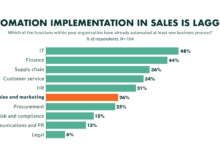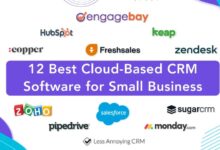Affordable CRM Software for Startups
Affordable CRM Software for Startups is crucial for early-stage businesses navigating the complexities of growth. Choosing the right system requires careful consideration of pricing models, essential features, integration capabilities, user-friendliness, and data security. This guide explores these key aspects, helping startups find the perfect balance between cost-effectiveness and functionality to propel their business forward.
This exploration delves into the nuances of CRM affordability for startups, analyzing various pricing tiers and their corresponding feature sets. We’ll compare the cost-benefit analysis of different solutions, highlighting essential functionalities crucial for early-stage ventures and the critical role of scalability. The importance of seamless integrations with other startup tools will be examined, alongside user-friendliness considerations and vital data security measures. Finally, we’ll explore the value of robust customer support and showcase successful startup CRM implementations, offering valuable insights for navigating this crucial decision.
Defining “Affordable” for Startups
Affordability in CRM software for startups is a relative concept, heavily influenced by the company’s size, stage of growth, and specific needs. It’s not simply about the lowest price tag; rather, it’s about finding a solution that delivers sufficient value for the investment. The optimal CRM will offer the necessary features to support business operations without straining the limited budget of a new venture.
Defining affordability involves considering various factors that directly impact the overall cost. These factors contribute to a comprehensive understanding of what constitutes a financially viable CRM solution for a startup.
Factors Influencing CRM Affordability for Startups
Several key factors determine whether a CRM is affordable for a startup. Pricing models play a significant role, with subscription-based models often proving more accessible than upfront licensing fees. The features offered directly correlate with cost; more comprehensive functionalities naturally command higher prices. Finally, a startup’s unique needs—the number of users, required integrations, and desired functionalities—will dictate the appropriate level of investment. A smaller startup with limited sales staff may find a basic CRM sufficient, while a rapidly scaling business may need a more advanced, and consequently more expensive, solution.
Examples of Pricing Tiers and Associated Features
CRM providers often offer tiered pricing structures. A hypothetical example could include a “Starter” plan costing $25 per user per month, offering basic contact management, task management, and email integration. A “Growth” plan, priced at $50 per user per month, might add features like sales pipeline management, reporting dashboards, and limited customisation. Finally, an “Enterprise” plan, costing $100 per user per month or more, could include advanced automation, robust analytics, and extensive API access for custom integrations. These prices are illustrative and vary significantly across providers.
Cost-Benefit Analysis of Various CRM Solutions for Startups
A cost-benefit analysis is crucial for startups choosing a CRM. Consider a startup comparing two solutions: Solution A, a basic CRM costing $25 per user per month, offers limited features but is easy to use and implement. Solution B, a more advanced CRM costing $75 per user per month, offers automation and robust analytics but has a steeper learning curve and implementation costs. The benefit of Solution B might lie in increased sales efficiency and improved data-driven decision-making. If this leads to a significant increase in sales, the higher cost might be justified. Conversely, if the startup’s sales process is simple and doesn’t require advanced analytics, Solution A might be the more financially sound choice, despite its limited features. The key is to accurately assess the value derived from each feature and weigh it against the associated cost. This involves projecting potential increases in revenue or efficiency against the CRM’s ongoing expenses. For example, if Solution B’s automation features lead to a 10% increase in sales, the extra cost may be easily offset by the increased revenue generated.
Essential Features for Startup CRMs
Selecting the right CRM is pivotal for a startup’s success. A well-chosen system streamlines operations, improves customer relationships, and ultimately fuels growth. Early-stage businesses need a CRM that’s both powerful enough to handle essential tasks and affordable enough to fit within a limited budget. This section details the core functionalities and scalability considerations for startup CRM software.
Choosing a CRM involves careful consideration of features that directly impact a startup’s ability to manage leads, track sales, and nurture customer relationships. Over-engineered or overly complex systems can be detrimental, leading to wasted resources and user frustration. Simplicity and efficiency should be paramount.
Core CRM Functionalities for Startups
Effective CRM software for startups should focus on core functionalities that directly contribute to revenue generation and customer satisfaction. These features are essential for managing the sales pipeline, tracking customer interactions, and ultimately driving growth.
The most important features include contact management (allowing for detailed profiles of customers and prospects), lead management (facilitating the tracking of leads from initial contact to conversion), sales pipeline management (visualizing the sales process and identifying bottlenecks), reporting and analytics (providing insights into sales performance and customer behavior), and basic communication tools (allowing for email integration and potentially other communication channels). These features provide a solid foundation for managing customer relationships and driving sales.
Scalability in Startup CRMs
Scalability is crucial for any startup CRM. As the business grows, so too will the volume of data and the complexity of operations. A scalable CRM can adapt to this growth without requiring a complete system overhaul. This adaptability minimizes disruption and ensures the CRM remains a valuable asset as the company expands.
A scalable CRM should offer features such as user management (allowing for easy addition and removal of users as the team grows), customizable workflows (allowing processes to be adapted to changing needs), and the ability to integrate with other business tools (allowing for seamless data flow between different systems). Consider a CRM with a pay-as-you-go model or one that offers flexible pricing plans to accommodate future growth without significant financial strain. For example, a startup initially using a free plan with limited users might easily upgrade to a paid plan with more features and users as its team expands.
Comparison of Affordable CRM Options
The following table compares the feature sets of three hypothetical affordable CRM options (CRM A, CRM B, and CRM C). Remember that specific features and pricing can vary significantly between providers, so it is crucial to conduct thorough research before making a decision.
| Feature | CRM A | CRM B | CRM C |
|---|---|---|---|
| Contact Management | Basic | Advanced | Advanced |
| Lead Management | Basic | Advanced | Advanced |
| Sales Pipeline Management | Basic | Advanced | Advanced |
| Reporting & Analytics | Limited | Comprehensive | Comprehensive |
| Email Integration | Yes | Yes | Yes |
| Mobile App | No | Yes | Yes |
| Integrations | Limited | Moderate | Extensive |
| Scalability | Moderate | High | High |
Integration Capabilities
A robust CRM’s value extends far beyond its core contact management functions. Seamless integration with other essential startup tools is crucial for maximizing efficiency and minimizing data silos. This interconnectedness allows for a streamlined workflow, preventing duplicated efforts and providing a holistic view of customer interactions. The right integrations can significantly impact a startup’s growth trajectory.
The ability to connect your CRM to other platforms, such as email marketing services, accounting software, and project management tools, significantly enhances operational efficiency. By centralizing data and automating processes, integrations eliminate manual data entry, reduce human error, and free up valuable time for strategic initiatives. This unified view of customer interactions fosters better decision-making and strengthens customer relationships.
Examples of Seamless Integrations with Popular Startup Tools
Many affordable CRMs offer pre-built integrations with popular business tools. These integrations often involve APIs (Application Programming Interfaces) that enable the smooth exchange of data between different software systems. For example, a common integration might involve syncing contact data from your CRM to your email marketing platform, ensuring that your email campaigns target the most relevant audience segments. Another valuable integration could be connecting your CRM to your accounting software to automate invoice generation and track payments linked to specific customer interactions.
Comparison of Integration Capabilities of Three Affordable CRM Platforms
Let’s compare the integration capabilities of three hypothetical affordable CRM platforms: “StartUpCRM,” “GrowCRM,” and “BoostCRM.” Note that specific integration offerings can change, so always check the vendor’s website for the most up-to-date information.
| Feature | StartUpCRM | GrowCRM | BoostCRM |
|---|---|---|---|
| Email Marketing Integrations | Integrates with Mailchimp, ConvertKit | Integrates with Mailchimp, ActiveCampaign, Sendinblue | Integrates with Mailchimp only. Zapier integration for broader connectivity. |
| Accounting Software Integrations | Integrates with Xero | Integrates with Xero, QuickBooks Online | No direct integrations; relies on Zapier for connectivity. |
| Project Management Integrations | No direct integrations | Integrates with Asana | Integrates with Trello, Asana |
| E-commerce Integrations | Limited integrations; requires custom development for most platforms. | Integrates with Shopify | Integrates with Shopify, WooCommerce |
This table illustrates how integration capabilities can vary significantly between even similarly priced CRM systems. StartUpCRM offers a good selection of integrations for essential tools, while GrowCRM provides a broader range. BoostCRM, while having fewer direct integrations, leverages Zapier to expand its connectivity options, offering a more flexible, albeit potentially more complex, approach. The best choice depends on a startup’s specific needs and technical capabilities.
User-Friendliness and Ease of Use
A startup’s success hinges not only on a great product but also on efficient internal processes. Choosing a CRM that’s easy to navigate and understand is crucial, especially when your team might lack dedicated IT support. An intuitive interface empowers everyone, from sales reps to marketing managers, to effectively utilize the system, maximizing its value and minimizing frustration.
The importance of intuitive interfaces for non-technical users cannot be overstated. A user-friendly CRM minimizes the learning curve, allowing employees to quickly master the software and focus on their core responsibilities rather than wrestling with complex menus or confusing functionalities. This translates directly to increased productivity and improved data accuracy. A poorly designed CRM can lead to data entry errors, missed opportunities, and ultimately, a negative impact on the bottom line. Conversely, a well-designed system empowers employees and contributes to a more efficient workflow.
Onboarding Processes for Three Affordable CRM Options
The onboarding process significantly impacts a user’s initial experience and long-term adoption of a CRM. Three popular affordable options illustrate different approaches. While specific steps may vary based on the chosen plan and features, these examples highlight general trends.
* HubSpot CRM: HubSpot offers a remarkably straightforward onboarding experience, often relying on guided tutorials and interactive elements within the platform itself. Users are typically presented with a series of short videos and prompts that walk them through essential functionalities. The emphasis is on practical application rather than dense documentation. This approach is ideal for visual learners and those who prefer a hands-on introduction.
* Zoho CRM: Zoho’s onboarding tends to be more comprehensive, often including a blend of interactive tutorials, written documentation, and potentially, access to webinars or online support resources. While this might seem more intensive initially, it offers a deeper level of understanding for users who prefer a more structured learning experience. The detailed documentation is beneficial for troubleshooting and addressing specific use cases.
* Bitrix24: Bitrix24 provides a more multifaceted onboarding, offering various options including video tutorials, detailed documentation, and often, personalized support from their customer service team. This approach caters to a wider range of learning styles and offers assistance for users who may require more individual guidance. The variety of support options is particularly beneficial for teams with diverse technical skills.
Key Usability Features of an Ideal Startup CRM
A truly user-friendly startup CRM should prioritize ease of navigation and intuitive design. The following features are essential for maximizing user adoption and productivity.
- Clear and concise interface: Avoid clutter and unnecessary complexity. Prioritize essential features and present information in a logical, easy-to-understand manner.
- Drag-and-drop functionality: Allows for easy customization and reorganization of dashboards and views.
- Customizable dashboards: Enables users to tailor their view to focus on the most relevant metrics and information.
- Intuitive search functionality: Facilitates quick access to specific contacts, deals, or other data points.
- Mobile responsiveness: Ensures accessibility and usability across various devices.
- Robust reporting and analytics: Provides clear, actionable insights without requiring advanced data analysis skills.
- Excellent customer support: Provides readily available resources and assistance to address any issues or questions.
Data Security and Privacy
Protecting your startup’s valuable customer data is paramount. A robust CRM system should offer comprehensive security measures to safeguard sensitive information from unauthorized access, breaches, and misuse. Choosing a CRM with inadequate security can expose your business to significant legal and financial risks, damaging your reputation and hindering growth.
Data security in a CRM involves a multifaceted approach, encompassing technical safeguards, organizational policies, and employee training. Startups should prioritize CRMs that prioritize data encryption both in transit and at rest, along with robust access controls and regular security audits. Furthermore, compliance with relevant data privacy regulations, such as GDPR and CCPA, is crucial for maintaining customer trust and avoiding penalties.
Security Measures in Affordable CRM Solutions
Startups should look for several key security features in their CRM. Data encryption ensures that information is unreadable without the proper decryption key, protecting it from interception during transmission or storage. Access controls, such as role-based permissions, limit who can view, edit, or delete specific data, preventing unauthorized access. Regular security audits and penetration testing help identify and address vulnerabilities before they can be exploited. Multi-factor authentication adds an extra layer of security, requiring users to provide multiple forms of verification before accessing the system. Finally, a clear data backup and recovery plan is crucial for mitigating the impact of data loss or system failures. These measures, when implemented effectively, significantly reduce the risk of data breaches and maintain data integrity.
Best Practices for Data Protection within a CRM System
Implementing strong data protection practices extends beyond the CRM software itself. Regular employee training on data security policies and best practices is essential. This includes educating employees on phishing scams, password security, and the importance of reporting suspicious activity. Data minimization involves only collecting and storing the data absolutely necessary for business operations. Regular data audits help identify and address any inconsistencies or vulnerabilities in data handling processes. Finally, adhering to relevant data privacy regulations, such as GDPR or CCPA, is critical for ensuring compliance and maintaining customer trust. These practices, in conjunction with robust CRM security features, provide a comprehensive approach to protecting sensitive customer data.
Security Feature Comparison of Three Affordable CRM Solutions
| CRM Solution | Data Encryption | Access Controls | Security Audits | Compliance |
|---|---|---|---|---|
| HubSpot CRM (Free Plan) | Yes, both in transit and at rest | Role-based permissions | Regular security updates and patches | GDPR, CCPA compliant |
| Zoho CRM (Free Plan) | Yes, both in transit and at rest | Role-based permissions, user-level access control | Regular security updates and patches | GDPR, CCPA compliant |
| Bitrix24 (Free Plan) | Yes, both in transit and at rest | Detailed access control settings | Regular security updates and patches | GDPR compliant |
Note: Specific security features and compliance certifications can vary depending on the chosen plan and region. Always refer to the vendor’s official documentation for the most up-to-date information. The “Free Plan” references are for illustrative purposes and should not be interpreted as a comprehensive representation of all features across all plans.
Customer Support and Resources
For startups, choosing the right CRM is crucial for growth, but equally important is the level of support offered by the provider. A reliable support system can significantly reduce the learning curve, prevent costly errors, and ensure the smooth operation of your business processes. Effective customer support translates directly into increased productivity and a faster return on investment.
Choosing a CRM with robust support minimizes downtime and frustration, allowing your team to focus on core business activities rather than troubleshooting software issues. Startups, often operating with limited resources, benefit greatly from readily available assistance to navigate any challenges that may arise.
CRM Support Channels and Response Times
Access to timely and effective support is paramount. Different CRM providers offer varying support channels, each with its own advantages and disadvantages. Understanding these differences helps startups make informed decisions based on their specific needs and preferences. Quick response times are essential for minimizing disruption and resolving issues efficiently. A comprehensive knowledge base, tutorials, and documentation can also significantly reduce the need for direct support contact.
| CRM | Support Channels | Response Time (Estimate) | Resources Available |
|---|---|---|---|
| HubSpot CRM (Free Plan) | Email, Online Help Center, Community Forum | 24-48 hours (email); Varies (forum) | Extensive documentation, video tutorials, blog posts, and a large active community forum. |
| Zoho CRM (Free Plan) | Email, Phone, Online Help Center, Knowledge Base | 24-48 hours (email); Varies (phone) | Comprehensive knowledge base, FAQs, video tutorials, and online documentation. |
| Bitrix24 (Free Plan) | Email, Phone, Online Help Center, Community Forum | 24-48 hours (email); Varies (phone and forum) | Documentation, video tutorials, and a community forum, although the resources might be less extensive than HubSpot or Zoho. |
Scalability and Future Growth
Choosing a CRM that can adapt to your startup’s evolving needs is crucial for long-term success. A system that works flawlessly today might become a bottleneck as your customer base expands and your operations become more complex. Understanding how a CRM scales is therefore essential for making an informed decision.
A scalable CRM seamlessly adapts to your growing business needs. This means it can handle increasing volumes of data, more users, and more complex workflows without significant performance degradation or requiring a complete system overhaul. Consider it an investment in your future efficiency and growth. Failing to account for scalability can lead to costly migrations and disruptions down the line.
CRM Scalability Evaluation
Evaluating the scalability of different CRM solutions requires a multi-faceted approach. Factors to consider include the platform’s architecture (cloud-based solutions generally offer better scalability than on-premise systems), its capacity for handling data growth, its ability to integrate with other tools as your tech stack expands, and the vendor’s track record of supporting rapid growth in their customer base. Requesting detailed information about the CRM’s infrastructure, performance benchmarks under various load conditions, and customer success stories from companies experiencing similar growth trajectories will provide valuable insights.
Illustrative Example of CRM Scalability: A Tiered Approach
Imagine a CRM platform visualized as a pyramid. The base represents the initial setup for a small startup, perhaps with a few dozen contacts and a small sales team. This base level includes core features like contact management, basic reporting, and email integration. As the startup grows, the pyramid expands. The next tier might involve adding features like marketing automation, sales forecasting, and more advanced reporting capabilities to accommodate a larger team and more complex sales cycles. This expansion represents the CRM’s ability to handle increased data volume and user activity. The top tier of the pyramid symbolizes the fully mature CRM system supporting a large enterprise with thousands of contacts, multiple sales teams, and a sophisticated suite of integrated tools. This visualization illustrates how a well-designed CRM can seamlessly adapt to various stages of growth, scaling up its resources and functionality without requiring a complete system replacement. This scalability minimizes disruption and ensures that the CRM remains a valuable asset throughout the company’s journey.
Case Studies of Successful Startup CRM Implementations
Choosing the right CRM can significantly impact a startup’s trajectory. Several startups have leveraged affordable CRM solutions to overcome operational hurdles and achieve remarkable growth. The following case studies illustrate how strategic CRM implementation can drive sales, enhance customer relationships, and ultimately fuel business expansion.
Case Study 1: “E-commerce Startup X” and HubSpot CRM
E-commerce Startup X, a direct-to-consumer brand selling handcrafted jewelry, initially managed customer interactions through spreadsheets and email. This proved increasingly inefficient as their customer base grew. They implemented HubSpot CRM, a freemium option offering a robust suite of features for smaller businesses. The transition involved migrating existing customer data, training employees on the new system, and customizing workflows to match their sales process. Challenges included integrating HubSpot with their existing e-commerce platform and overcoming initial resistance to adopting a new system from some team members. Solutions involved leveraging HubSpot’s extensive integration capabilities and implementing a phased rollout of the CRM, providing ongoing training and support. The positive impact was immediate: improved customer segmentation allowed for targeted marketing campaigns, leading to a 20% increase in sales within six months. Automated email sequences reduced manual effort and improved customer engagement, resulting in higher customer lifetime value.
Case Study 2: “Tech Startup Y” and Zoho CRM
Tech Startup Y, a developer of mobile applications, faced difficulties tracking leads and managing the sales pipeline effectively. Their previous system was disorganized and lacked the reporting capabilities needed to analyze sales performance. They chose Zoho CRM, known for its affordability and scalability. The primary challenge was integrating Zoho CRM with their various development tools and project management software. They addressed this by utilizing Zoho’s API and custom integrations, requiring some initial investment in developer time. Another challenge was ensuring data consistency across different teams. This was resolved by implementing standardized data entry procedures and providing regular training sessions. The result was a streamlined sales process, improved lead conversion rates, and more accurate sales forecasting. They experienced a 15% increase in sales leads and a 10% improvement in lead conversion rates within the first year of implementation.
Case Study 3: “SaaS Startup Z” and Freshsales CRM
SaaS Startup Z, offering a project management platform, needed a CRM that could scale with their rapid growth. They selected Freshsales CRM for its affordability and scalability features. The biggest hurdle was migrating their existing customer data from a legacy system, ensuring data integrity and accuracy. This was accomplished through a careful data migration plan, involving data cleansing and validation before importing. Another challenge was adapting their sales team’s workflow to the new CRM system. Freshsales’ intuitive interface and customizable dashboards minimized this disruption, and training was provided to ensure smooth transition. The benefits included improved sales team productivity, better customer relationship management, and more effective lead nurturing. They observed a 25% increase in sales efficiency and a significant reduction in customer churn within nine months.
Ultimate Conclusion
Ultimately, selecting affordable CRM software for a startup hinges on aligning the software’s capabilities with the company’s specific needs and growth trajectory. By carefully evaluating pricing models, essential features, integration capabilities, user experience, security measures, and customer support, startups can confidently choose a CRM solution that empowers them to manage customer relationships effectively, optimize operations, and drive sustainable growth. Remember that the “best” CRM is the one that best fits your unique circumstances and empowers your team.





